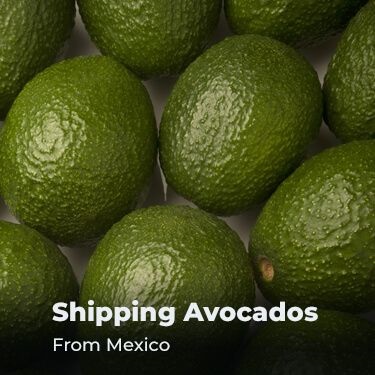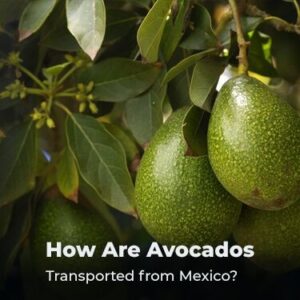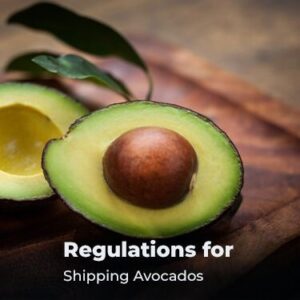
Por
 Copiar URL al Portapapeles
Copiar URL al Portapapeles
Knowing about shipping avocados from Mexico is crucial to service a U.S. market hungry for the green produce.
Learning more about avocados themselves, the way to transport them and the United States Department of Agriculture’s (USDA) regulations will make shipping avocados from Mexico an easier process and get them into the marketplace looking and tasting their best with minimal hassle.
Table of Contents
The most popular avocado exported from Mexico worldwide is the Hass avocado. Shoppers will recognize the dark-green, bumpy-skinned fruit. Eighty-percent of avocados worldwide are of the Hass variety.
Part of the reason behind the desire for avocados is its year-round availability and tough exterior. Mexican Hass avocados have thicker skin, have a longer shelf life, ripen more slowly and also change color when they’re ripe.
Other kinds of avocados produced in Mexico include:
There are about 275,000 acres in Mexico for the avocados grown and exported to America. Mexico produces 3 billion total pounds of avocados each year. Eighty percent of Mexico’s production comes from Michoacan, a Mexican state featuring fertile volcanic soil conducive to growing avocados.
A lot of Americans’ first exposure to avocados came from guacamole, a Mexican dip that is comprised mostly of the fruit. Avocados are part of a healthy diet because they are:
In 2017, 1.93 billion avocados entered the United States avocado market, which accounted for 1.73 billion pounds of the fruit. That number translates into 5 Mexican avocados eaten per year by each American and is a total of 784,714 metric tons. With the United States’ affinity for avocados rising each year, importing this type of produce is necessary to meet demand.
In California, which produces 90% of U.S. avocados, the produce is seasonal and generally harvested between April and July.
 How Are Avocados Transported from Mexico?
How Are Avocados Transported from Mexico?Mexico is important to American’s consumption of avocados. According to Politifact, the following statement — if Mexico’s avocado supply was shut off to the United States, the country would run out of avocados in three weeks — was rated as mostly true. So the significance of transporting those avocados across the border is high.
The USDA has the following recommendations:
There are rules for importing avocados into the U.S. First, fruit from the avocado industry is graded by the USDA. There are three grades, only two of which are available for human consumption:

Both Grade 1 and 2 avocados must be free of dirt, staining or any other foreign material and neither can be considered misshapen.
Getting your shipment through U.S. Customs and Border Patrol (CBP) is the biggest hurdle to jump.
Fill out required paperwork in the allotted amount of time. A customs broker can help immensely. They are licensed by the CBP and can help with essential tasks like arranging duties to be paid, preparing and filing the customs entries, taking steps to help release the goods from CBP control and more.
The Food Modernization Safety Act (FMSA) also needs proper consideration. Implemented in 2017, the act involves ensuring food safety while produce is in transport. The Food and Drug Administration (FDA) makes sure the FMSA is enforced.
Requirements under the FMSA:
The CBP will not release the food without compliance with the paperwork and safety guidelines.
Picking the right company for shipping avocados from Mexico will help you achieve your goals. R+L Global Logistics can handle it for you.
For your avocados, we have climate-controlled trucks, a 99.5% on-time success rate and more than 30 years of logistics and freight experience. We also have licensed customs brokers and a bilingual staff ready to assist. If you're looking for Eagle Pass cross border shipping or want to ship avocados through any other port, R+L Global Logistics can help./
We’ll make your ability to ship avocados from Mexico simple and free of difficulty. Contact us to receive a quote for your avocado shipment or to ask any questions about other shipments, including shipping medical devices and electronics manufacturing.
 Copiar URL en el Portapapeles
Copiar URL en el Portapapeles

Helw i hope your doing well ,am justin from Tanzania Njombe region , i am the the farmer of avocado, can i be the broker of collecting those avocado and export to you also need to know if there any condition. Thank you.
How long does it take to import avocados??
I lived in St. Louis, MO. I have grocery shop and coffee shop in a strip mall. The area Large concentration of Latino population. I want to import avocado, raw coffee beans, etc from Mexico time to time. Can you help me? Let me know.